Updated April 13, 2023 at 11:51 AM ET
Editor's Note: As indicated below, this story has been updated with information received after its initial publication.
All these years later, the Marines who survived are still haunted by the blinding flash and the piercing screams.
"I knew who some of the guys were that got hit," Chris Covington remembers, "because I recognized their screams."
On the night of April 12, 2004, a deadly explosion rocked a schoolhouse in Fallujah, Iraq, where U.S. troops had set up a temporary base. Two Marines died and a dozen were wounded, some severely.
But as seared as the fatal explosion is in the men's memory, to the Pentagon it's as if it never happened.
An NPR investigation found that the explosion at the schoolhouse in Fallujah was a tragic accident — the worst Marine-on-Marine "friendly fire" of recent decades. Officers determined almost immediately that the explosion was caused by an errant 81 mm mortar fired by the victims' own comrades, yet the families of the dead men weren't told for years, despite Marine Corps regulations. Some of the wounded have never been told.
Three officers involved in the deadly mortar fire were recommended for punishment, but that was rejected by the Marines' ground commander in Iraq — Maj. Gen. James Mattis. Consequently, no one was ever disciplined.
And NPR found another secret: An officer who was part of the confusion, but was not cited for discipline, was the son of an important and powerful member of Congress. Then-1st Lt. Duncan D. Hunter was working in the command center that mistakenly approved the mortar launch. His father — U.S. Rep. Duncan L. Hunter — was then-chairman of the House Armed Services Committee, responsible for oversight of the war.
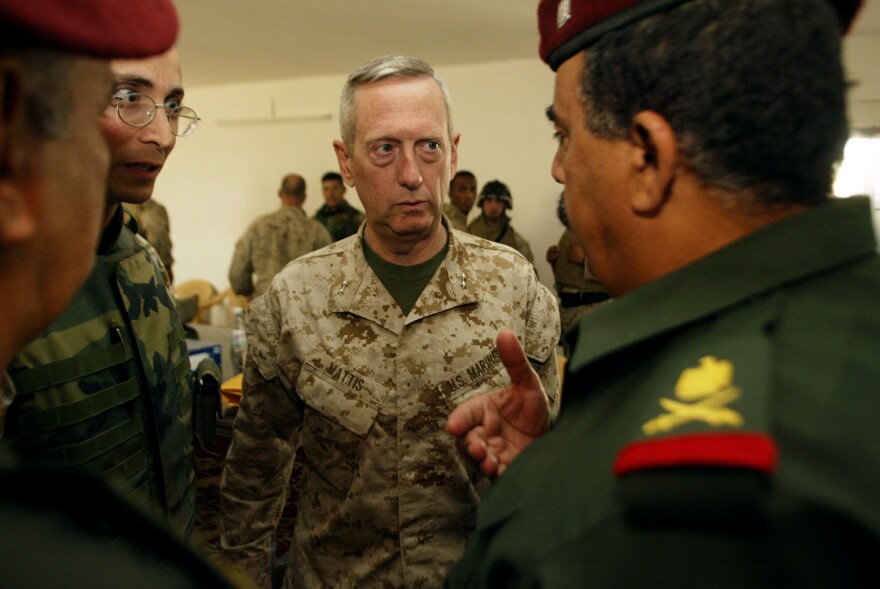
In interviews, Pentagon officials and officers involved didn't explain why families were initially told the Marines died from hostile fire, or why the mishap isn't used as a case study in Marine Corps training. Or why for years, the Pentagon claimed it had no record of the mishap or any investigations, until a federal judge forced the Marines to conduct additional searches and turn over documents in response to an NPR lawsuit.
"I thought some enemy blew himself up in our compound. My first thought. And that means we have people probably coming in the wire," said retired Sgt. Maj. William Skiles. "So, it was smoke, I couldn't see — flashlights everywhere, and screaming everywhere."
Skiles remembers how confused he and others were by the blast. What had just happened? Did someone fumble a grenade? Was this a rocket that targeted them?
However, Marine commanders knew instantly that it was a terrible mistake.
"My heart sank," said then-Lt. Col. Gregg Olson, who was the battalion commander and approved the mortar mission.
A Marine 81 mm mortar sailed into the school's courtyard, killing Lance Cpls. Brad Shuder and Robert Zurheide, as well as an Iraqi interpreter. A dozen others were wounded, three so seriously that they had to be medically retired. It was the worst Marine-on-Marine "friendly fire" in decades, but the families weren't told the truth about how the men died. They were told by Marine officers who knocked on their doors that the deaths were the result of hostile fire.
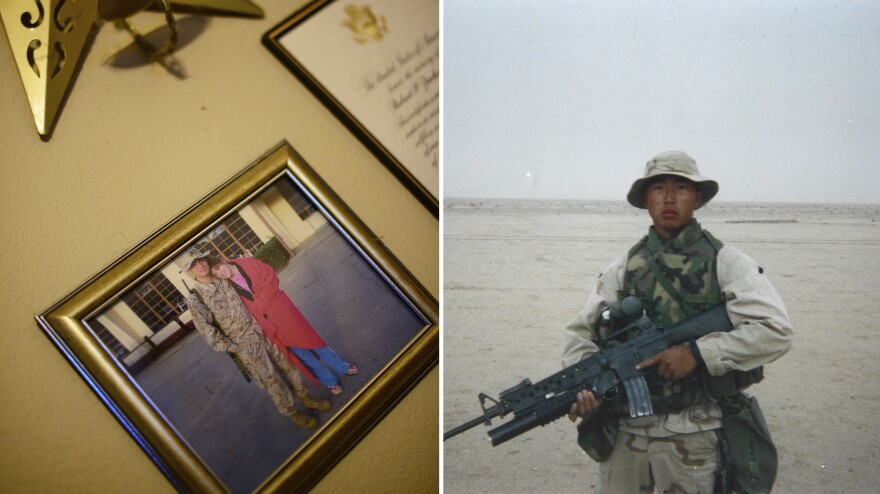
Not only that, the Marines failed to follow their own procedures and tell the families an investigation had begun. The Marines also failed to tell the families when the investigation concluded four months after the explosion that the cause was friendly fire.
It would take three more years before families were told the truth, when the Marine leadership was ordered to appear before Congress. Some of those wounded only learned recently what happened — because they were told by NPR reporters.
As part of a years-long investigation, NPR talked to the families, the Marines and members of Congress. We asked the Marines for a copy of any investigation about the incident — filed a request under the Freedom of Information Act. The Marines said they couldn't find one.
NPR obtained a copy of the report from Elena Zurheide, the widow of Robert, one of the Marines killed. Nearly two decades ago, she had been pregnant with their first child, due on April 12, 2004, the same day Robert died.
She remembered the Marines initially telling her it was hostile fire. A few days after the mortar explosion, Robert's friends began to tell her it was friendly fire. One of those friends, Covington, was a lance corporal at the time. He said he got into trouble with his Marine command and was ordered to keep quiet.
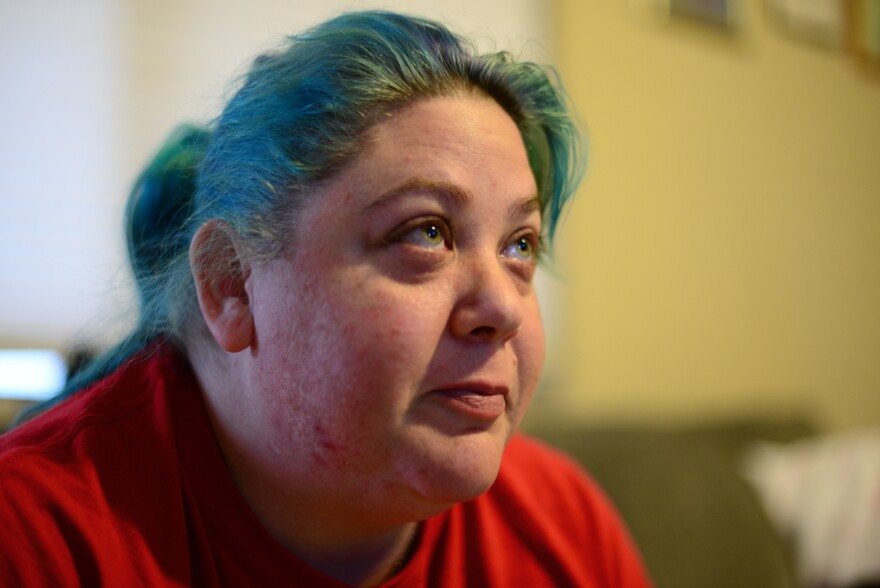
Elena Zurheide recalled what the Marines finally told her in 2007: It was friendly fire, and no one was punished. The Marine Corps investigation — known as a JAG Manual investigation, or JAGMAN investigation — concluded that the bungled mortar mission was caused by two mistakes. The first was the failure of an officer to specify "danger close" when requesting the mission, meant to take out a barricade of tires set up by Iraqi insurgents. Those two words would have alerted those in the command center to pay extra-close attention because friendly troops were close to the target and in danger of being killed or wounded.
The second mistake came in the command center. The battalion commander, Olson, walked in and was informed that a mortar mission had been requested. He was told the target was 400 meters from friendly troops — a relatively safe distance — and Olson approved the mortar mission. The actual target, the tire barricade, was just over 100 meters from U.S. forces. And the mortar is not a precise weapon, often off by many meters.
Loading...
Olson recently told NPR that Duncan D. Hunter had pointed to the wrong target on a map, though that detail is not in his statement in the 2004 investigative report. As Olson described it, Hunter's misidentification was the first step in the command center confusion that resulted in the tragedy.
Yet after this story was initially published, Olson invited NPR back to the Pentagon for a follow-up interview and said he wanted to "clarify" his story about Hunter. He said it was another officer's mistake that triggered the mishap.
"I didn't have it right the first time I talked to you," he said. Of Hunter Jr., he said: "I don't recall him pointing to anything."
Hunter, who later held his father's seat in Congress, declined multiple requests for an interview with NPR.
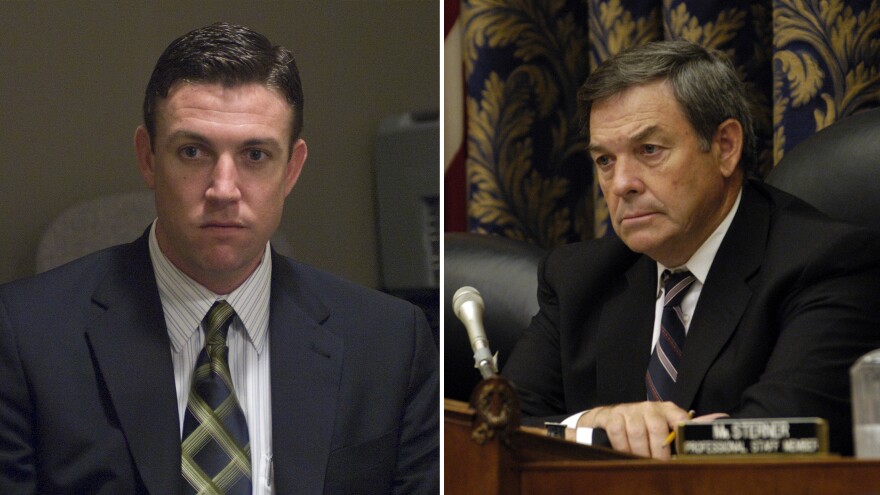
The mortar round devastated the second platoon of Echo Company 2/1, leading not only to death and serious wounds, but to confusion, anger and guilt — and heartache among the survivors that persists to this day.
Jason Duty is a Navy corpsman, or combat medic, who tended to the wounded that night. We shared the investigative report with him, and he told us he read it one night at a bar. "I think that was the first time ... in my entire life I've ever had what they call a real flashback. I was really there for a few seconds. I could smell the blood and the meat 'cause it smells like a butcher shop in there. I could smell the smoke. I could smell the dust. I could remember sneezing because I got so much f****** dust in my nose. I can remember Shuder screaming and screaming and screaming," he said.
After Mattis decided no one would be punished, he sent his recommendations to his boss, then-Lt. Gen. James Conway, the top Marine officer in Iraq. Conway agreed with Mattis and signed off on the report two days after a visit to his headquarters in Iraq from Rep. Duncan L. Hunter, the chairman of the House Armed Services Committee.
Mattis declined NPR's interview request. For months, NPR reporters reached out to Conway through phone messages and emails. No response. Finally, NPR talked with Conway outside his home in Annapolis and handed him a letter with questions about the friendly fire incident in Fallujah. He said he couldn't recall it and would have to refresh his memory.
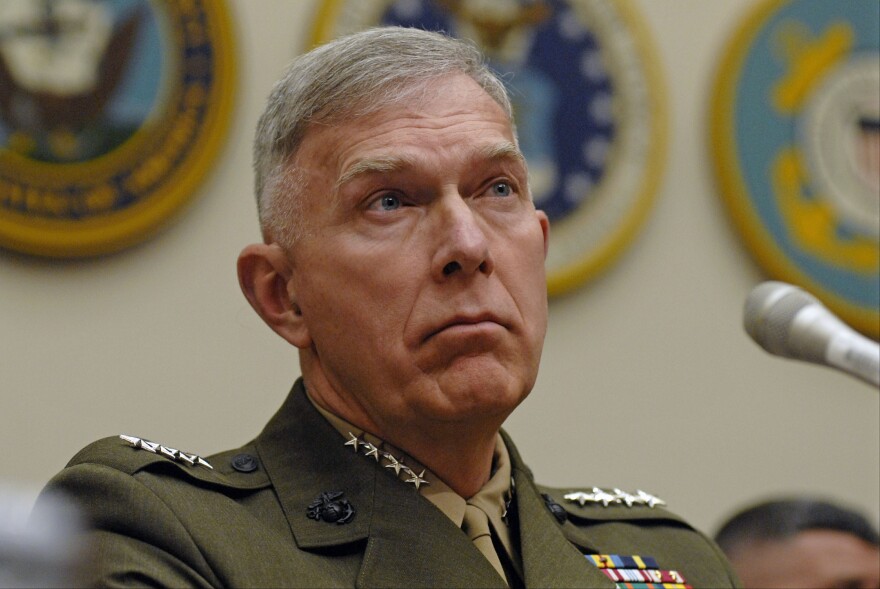
Five months later, he sent this reply in an email: "The regrettable incident, in the heat of combat, was made worse by the failure of higher command to properly notify family members that their Marines had died from friendly fire — a failure that was corrected by the Assistant Commandant of the Marine Corps as soon as it was discovered."
What the general failed to explain was that the Marine Corps only "discovered" the problem after a Capitol Hill hearing where they failed to fully account for friendly fire incidents. They were ordered back to testify a second time, where they finally acknowledged the deadly mistake at the schoolhouse.
Only later did NPR discover that Conway obtained a copy of the investigative report after requesting it from one of the Marines we interviewed.
Listen to Taking Cover, an NPR investigative series from the Embedded podcast, to learn more about the deadly 2004 friendly fire accident in Fallujah, Iraq.
Copyright 2024 NPR. To see more, visit https://www.npr.org.






